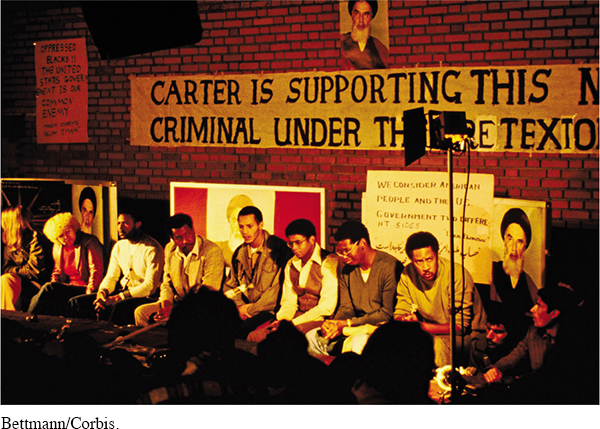The American Promise: Printed Page 874
The American Promise, Value Edition: Printed Page 792
The American Promise: A Concise History: Printed Page 904
The Cold War Intensifies
The American Promise: Printed Page 874
The American Promise, Value Edition: Printed Page 792
The American Promise: A Concise History: Printed Page 904
Page 874Consistent with his human rights approach, Carter preferred to pursue national security through nonmilitary means and initially sought accommodation with the nation’s Cold War enemies. Following up on Nixon’s initiatives, in 1979 he opened formal diplomatic relations with the People’s Republic of China and signed a second strategic arms reduction treaty with Soviet premier Leonid Brezhnev.
Yet that same year, Carter decided to pursue a military buildup when the Soviet Union invaded neighboring Afghanistan, whose recently installed Communist government was threatened by Muslim opposition (see Map 30.3). Carter imposed economic sanctions on the Soviet Union, barred U.S. participation in the 1980 Summer Olympic Games in Moscow, and obtained legislation requiring all nineteen-
The American Promise: Printed Page 874
The American Promise, Value Edition: Printed Page 792
The American Promise: A Concise History: Printed Page 904
Page 875Claiming that Soviet actions jeopardized oil supplies from the Middle East, the president announced the “Carter Doctrine,” threatening the use of any means necessary to prevent an outside force from gaining control of the Persian Gulf. His human rights policy fell by the way-
Events in Iran also encouraged this hard-
Carter’s decision to allow the shah into the United States for medical treatment enraged Iranians, who believed that the United States would restore him to power as it had done in 1953. On November 4, 1979, a crowd broke into the U.S. Embassy in Iran’s capital, Tehran, and seized sixty-

The American Promise: Printed Page 874
The American Promise, Value Edition: Printed Page 792
The American Promise: A Concise History: Printed Page 904
Page 876The disastrous rescue attempt and scenes of blindfolded U.S. citizens paraded before TV cameras fed Americans’ feelings of impotence, simmering since the defeat in Vietnam. These frustrations in turn increased support for a more militaristic foreign policy. Opposition to Soviet-
REVIEW How did Carter implement his commitment to human rights, and why did human rights give way to other priorities?